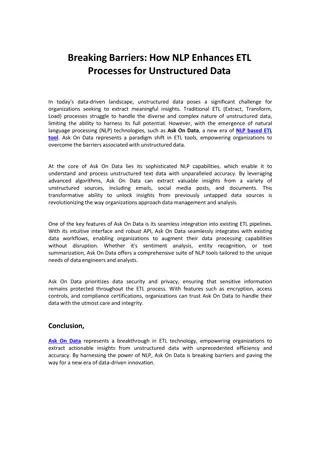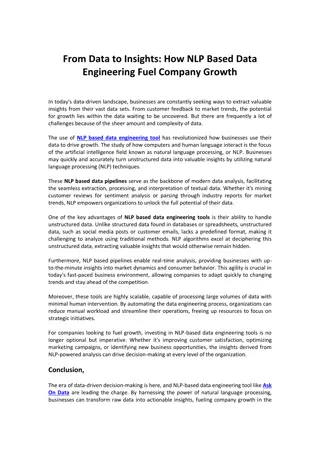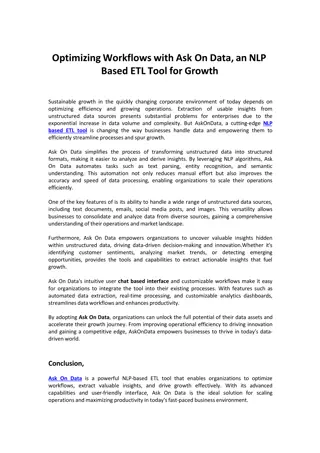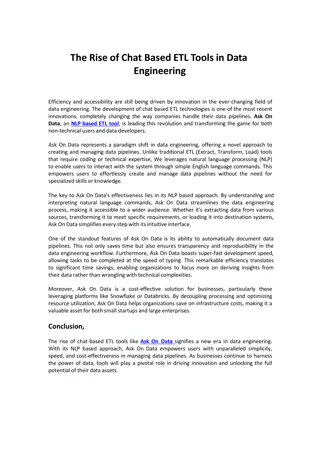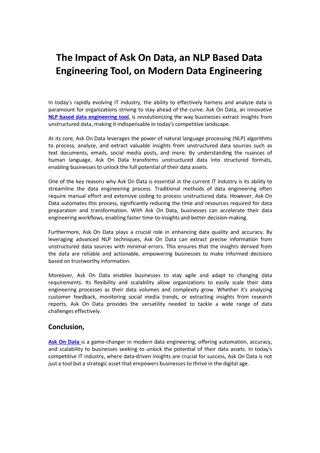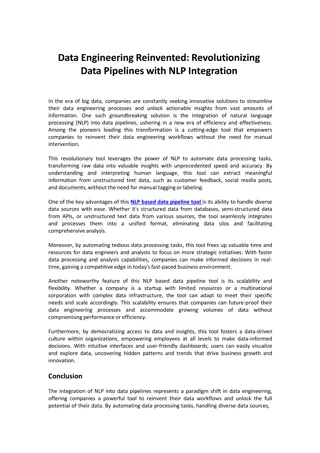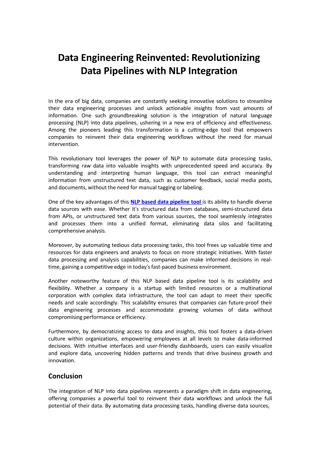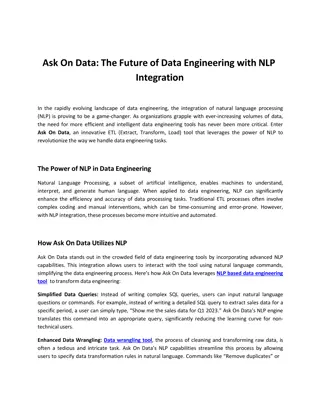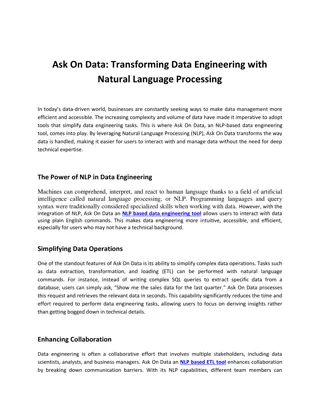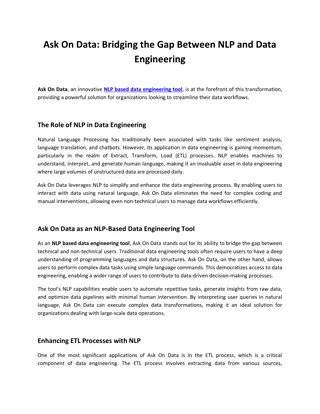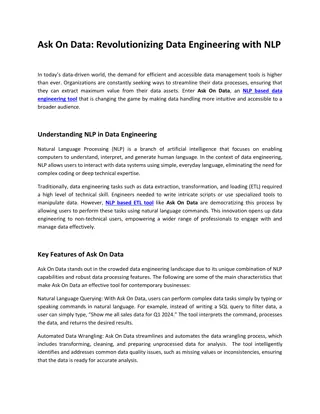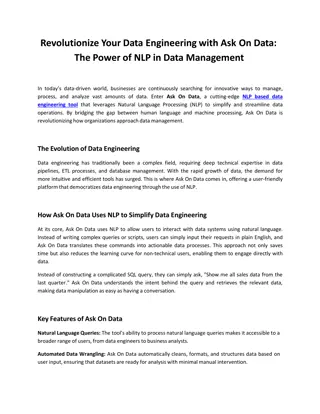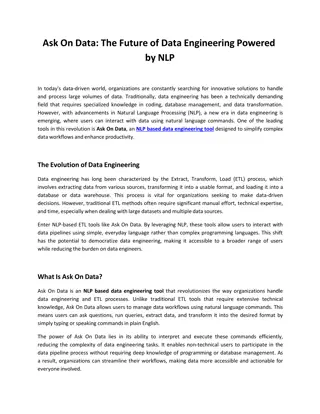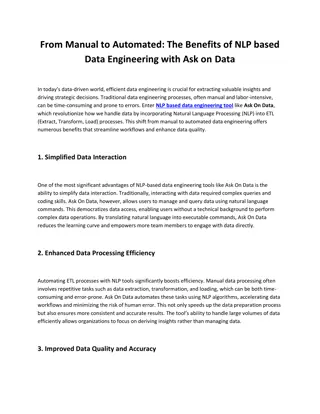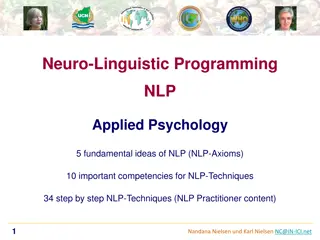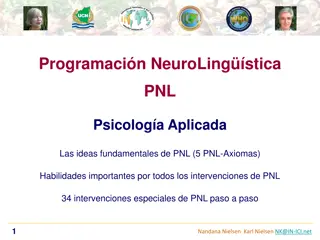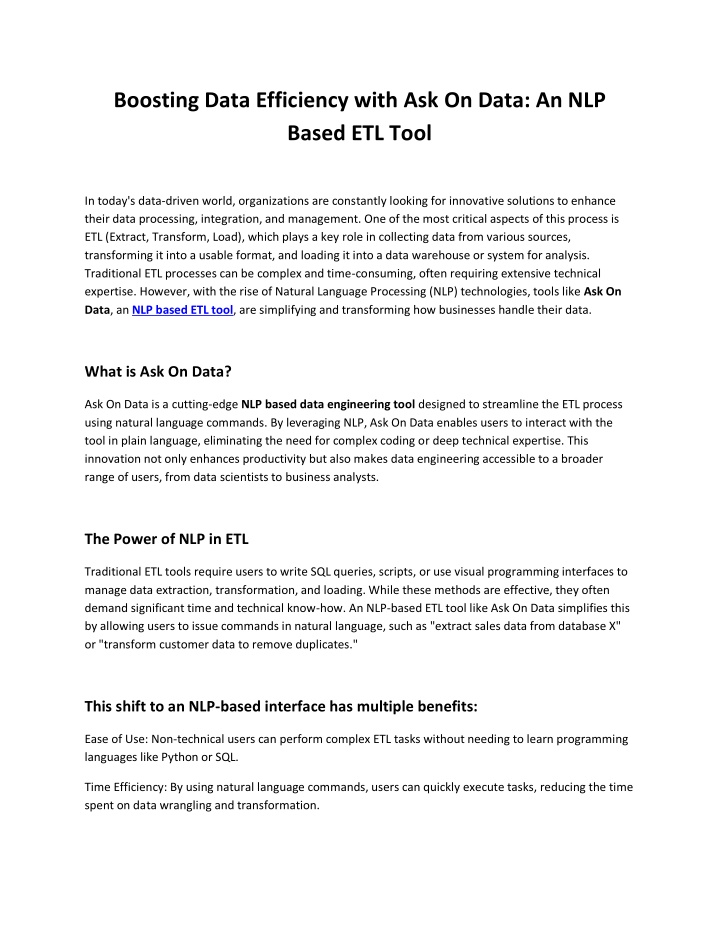
Boosting Data Efficiency with Ask On Data An NLP Based data engineering Tool
In today's data-driven world, organizations are constantly looking for innovative solutions to enhance their data processing, integration, and management. One of the most critical aspects of this process is ETL (Extract, Transform, Load), which plays
Download Presentation

Please find below an Image/Link to download the presentation.
The content on the website is provided AS IS for your information and personal use only. It may not be sold, licensed, or shared on other websites without obtaining consent from the author. If you encounter any issues during the download, it is possible that the publisher has removed the file from their server.
You are allowed to download the files provided on this website for personal or commercial use, subject to the condition that they are used lawfully. All files are the property of their respective owners.
The content on the website is provided AS IS for your information and personal use only. It may not be sold, licensed, or shared on other websites without obtaining consent from the author.
E N D
Presentation Transcript
Boosting Data Efficiency with Ask On Data: An NLP Based ETL Tool In today's data-driven world, organizations are constantly looking for innovative solutions to enhance their data processing, integration, and management. One of the most critical aspects of this process is ETL (Extract, Transform, Load), which plays a key role in collecting data from various sources, transforming it into a usable format, and loading it into a data warehouse or system for analysis. Traditional ETL processes can be complex and time-consuming, often requiring extensive technical expertise. However, with the rise of Natural Language Processing (NLP) technologies, tools like Ask On Data, an NLP based ETL tool, are simplifying and transforming how businesses handle their data. What is Ask On Data? Ask On Data is a cutting-edge NLP based data engineering tool designed to streamline the ETL process using natural language commands. By leveraging NLP, Ask On Data enables users to interact with the tool in plain language, eliminating the need for complex coding or deep technical expertise. This innovation not only enhances productivity but also makes data engineering accessible to a broader range of users, from data scientists to business analysts. The Power of NLP in ETL Traditional ETL tools require users to write SQL queries, scripts, or use visual programming interfaces to manage data extraction, transformation, and loading. While these methods are effective, they often demand significant time and technical know-how. An NLP-based ETL tool like Ask On Data simplifies this by allowing users to issue commands in natural language, such as "extract sales data from database X" or "transform customer data to remove duplicates." This shift to an NLP-based interface has multiple benefits: Ease of Use: Non-technical users can perform complex ETL tasks without needing to learn programming languages like Python or SQL. Time Efficiency: By using natural language commands, users can quickly execute tasks, reducing the time spent on data wrangling and transformation.
Error Reduction: NLP minimizes the chances of errors often associated with manual coding, ensuring cleaner and more reliable data pipelines. How Ask On Data Enhances Data Engineering As an NLP based data engineering tool, Ask On Data simplifies more than just the ETL process. It streamlines the entire data pipeline, making it easier to manage data from its extraction to its integration into data warehouses or business intelligence platforms. Here s how Ask On Data improves data engineering efficiency: Automated Data Wrangling: With Ask On Data, data wrangling tasks such as cleaning, reduplication, and normalization can be done through simple language instructions. For example, a user can command, "clean customer data to remove invalid entries," and the tool will automatically perform the necessary transformations. Seamless Data Integration: Ask On Data supports integration with multiple data sources and platforms, allowing users to connect databases, cloud services, and even APIs using natural language. Commands like "load sales data from API X into warehouse Y" allow seamless data flow without manual intervention. Faster Insights: The tool enables quicker data processing by reducing the need for manual coding. This means that organizations can derive insights faster, leading to better decision-making and business outcomes. Why Choose an NLP Based ETL Tool? There are several reasons why businesses should consider an NLP-based ETL tool like Ask On Data: Accessibility: By simplifying the ETL process through natural language, businesses can empower more teams to access and analyze data without needing specialized skills. This democratization of data makes insights accessible across departments, improving collaboration. Scalability: Ask On Data is built to handle both small and large-scale data engineering tasks, making it suitable for businesses of all sizes. Whether you re a startup managing small datasets or an enterprise dealing with massive amounts of data, Ask On Data can scale to meet your needs. Cost Efficiency: Automating complex ETL processes through NLP reduces the need for hiring extensive data engineering teams or investing in lengthy training programs for non-technical staff. This not only saves costs but also accelerates project timelines.
Ask On Data: The Future of Data Engineering As organizations continue to prioritize data-driven decision-making, the need for efficient, user-friendly data engineering tools will only grow. Ask On Data s NLP-based data engineering tool is at the forefront of this shift, providing businesses with a powerful platform to manage their data processes seamlessly. By simplifying ETL workflows with natural language commands, Ask On Data is not only boosting efficiency but also transforming how businesses approach data engineering. Conclusion, Ask On Data offers an innovative approach to ETL and data engineering by leveraging NLP technology. With its ability to automate complex tasks, reduce errors, and empower non-technical users, Ask On Data is revolutionizing the way businesses handle data. As the demand for smarter, faster, and more accessible data tools grows, Ask On Data stands out as a leading NLP-based ETL tool that meets the evolving needs of modern organizations.


